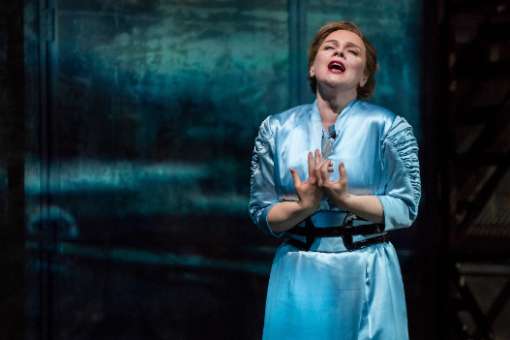Erich Wolfgang Korngold considered Das Wunder der Heliane his masterpiece, but history hasn’t kept up with that opinion. Unheard for decades before a recent renewal of interest, the opera makes a much-belated US debut as part of the Bard SummerScape festival, some 92 years after its premiere in Hamburg. As seen at the second of five performances, the production – directed by Christian Räth and conducted by Leon Botstein – offers a clue as to why the conductor valued it so highly, and why it has become a repertory rarity.

The work itself poses stylistic interpretive challenges. Hans Müller-Einigen’s libretto follows a fairytale framework, with an obvious debt to the psychologically tinged collaborations of Richard Strauss and Hugo von Hofmannsthal. A Stranger appears in an unnamed kingdom that seems to exist somewhere between the real world and the ether and offers hope to a downtrodden underclass. (The chorus, often heard but infrequently seen, gives voice to the proletariat – as well as to the moral and philosophical arguments of the piece.) The interloper also bewitches Heliane, the benevolent wife of the realm’s Ruler, and both pay dearly for their perceived transgression. Yet in a deus ex machina ending that nods to both storybooks and symbolism, they are ultimately redeemed by the power of love.
For all the potential action this set-up might promise, the resulting opera is rather staid and analytical – qualities too often shared by Räth’s mise-en-scene. Played against the backdrop of Esther Bialas’ monochromatic unit sets, the first act – a series of two-person scenes between The Stranger, The Ruler and Heliane – has a static nature that fails to imbue the thinly drawn characters with much depth. Matters grow more lively in the second act, when Heliane stands trial for her trespass, although the austere panel of judges who will decide her fate are identically costumed (also by Bialis) in high-collared blood-red garments that make them look like a David Lynch fantasia.
The extended musical interlude that opens the third act proves the most strikingly staged, thanks largely to expressive choreography by Catherine Galasso that provides a window into Heliane’s psyche. But the production’s final image – meant to seem ethereal and transcendent – instead looks cheap and hoary, and unsubtle lighting (by Thomas Hase) remains a hindrance throughout.
The musical footing is much firmer. Botstein led a thoughtful and affecting account of the score, though the American Symphony Orchestra showed signs of under-rehearsal in their occasional tuning issues and lack of coordination. Similarly, the Bard Festival Chorale, as prepared by James Bagwell, tended toward flatness, especially when singing offstage.
The opera’s supporting players were universally cast from strength, with mezzo-soprano Jennifer Feinstein making a particular impact as the sadistic Messenger; she fearlessly met the role’s punishing tessitura head-on, and crafted a multi-dimensional portrait from a role that is largely formed from stereotype. Similarly, tenor David Cangelosi made a piquant impression as the blind Chief Justice – who is also Heliane’s father, but must decide her fate. Cangelosi played that internal conflict par excellence. Baritone Nicholas Brownlee was memorable in the small role of the Porter.
Alfred Walker distinguished himself as the Ruler, his stentorian bass-baritone communicating the character’s chilling authority. Walker’s bell-clear German diction made every word count. Aušrinė Stundytė played the title role with compelling fervor, gradually emerging as the opera’s moral center. Although her wiry, high-lying soprano showed no signs of flagging, it often sounded hard-edged; this was most evident in Heliane’s second-act aria, “Ich ging zu ihm”, which lacked necessary delicacy and spin.
Daniel Brenna shouldered the punishing role of the Stranger with admirable stamina. But his once-clarion tenor has turned blunt and unmusical, and his acting often seemed awkward and uncomfortable. These elements don’t bode well for a character who is meant to be mysterious and otherworldly.
Although Bard’s assumption isn’t entirely successful, it still stands as an important and commendable achievement, for bringing a neglected and worthwhile work back into the spotlight. SummerScape’s exploration – or excavation – of Korngold will continue in August, with a concert staging of Die tote Stadt and a concert dedicated to his orchestral compositions.


